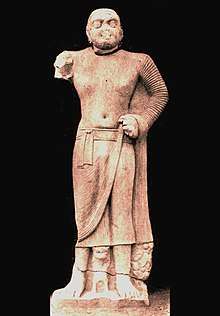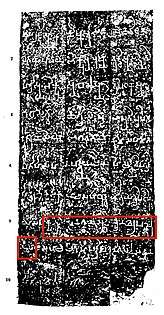Kharapallana
Kharapallana (ruled c. 130 CE) was an Indo-Scythian Northern Satrap. He is mentioned as a "Great Satrap" of Kushan ruler Kanishka I on an inscription discovered in Sarnath, and dated to the 3rd year of Kanishka (c. 130 CE), in which Kanishka mentions he was, together with Satrap Vanaspara, governor of the eastern parts of his Empire, while a "General Lala" and Satraps Vespasi and Liaka are put in charge of the north.[1][2][3]
Kharapallana
The inscription was discovered on an early statue of a Boddhisattva, the Sarnath Bala Boddhisattva, now in the Sarnath Museum .[4]
Vanaspara and Kharapallana were ruling for Kanishka over the eastern provinces of the Empire, including the Benares region.[5]
References
- Ancient Indian History and Civilization, Sailendra Nath Sen New Age International, 1999, p.198
- Foreign Influence on Ancient India, Krishna Chandra Sagar, Northern Book Centre, 1992 p.167
- Source: "A Catalogue of the Indian Coins in the British Museum. Andhras etc..." Rapson, p ciii
- Papers on the Date of Kaniṣka, Arthur Llewellyn Basham, Brill Archive, 1969, p.271
- Aspects of Political Ideas and Institutions in Ancient India, Ram Sharan Sharma, Motilal Banarsidass Publ., 1991 p.295
This article is issued from Wikipedia. The text is licensed under Creative Commons - Attribution - Sharealike. Additional terms may apply for the media files.

